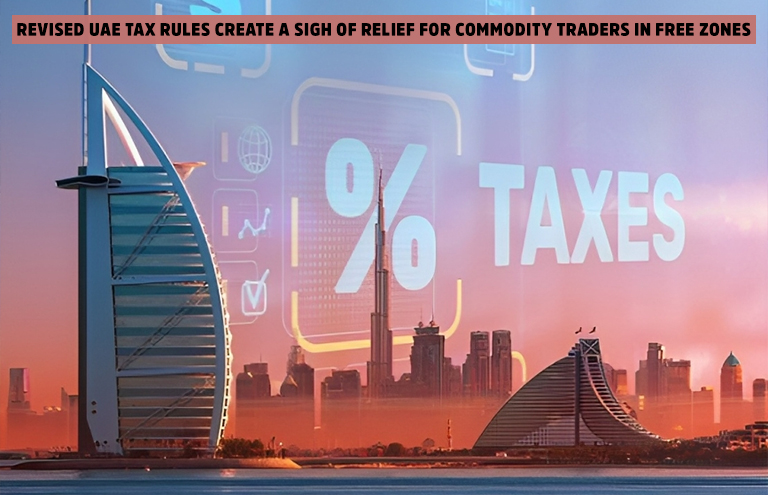
Revised UAE Tax Rules Bring Big Relief For Commodity Traders
Two renewed taxation decisions have been introduced with retrospective reverberations from the 1st of June 2023 after the previous decisions were successfully repealed. The previous decisions that were issued were the Cabinet Decision No. 55 of 2023 and the Ministerial Decision No. 139 of 2023, which addressed the concerns for the Free Zones (FZ) areas in the UAE. However, on the 1st of June 2023, both decisions were officially revoked and dismissed by two new decisions— Cabinet Decision No. 100 of 2023 and Ministerial Decision No. 265 of 2023.
The Cabinet Decision No. 100 of 2023 addresses and determines the QI (Qualifying Income) for the QFZP (Qualifying Free Zone Person), while the Ministerial Decision No. 265 of 2023 takes into consideration the QA (Qualifying Activities) and EA (Excluded Activities), which is intended for the taxation of corporations and business under the Federal Decree Law No. 47 of 2022, also known as the “CT Law”.
Younis Haji Al Khoori, the Under-Secretary of the Ministry of Finance, mentioned in his statement that Free Zones are fundamental to the economic growth of the UAE as it directly attracts foreign investments as well as promote an advantageous scope for businesses to grow. The new Decisions indicate the ways the Free Zone areas will continue to play a significant role in expanding the allegiance and strategies of UAE’s economy, by balancing with the standards of global tariffs. He said, “The certainty of a competitive Corporate Tax regime and offering a special regime for Free Zones cements the UAE’s position as a leading global hub for business and investment and drives its sustainable development agenda.”
The recently established Decisions brought about a few crucial additional laws and explanations for those trades and commerce entitled under the UAE Free Zone areas.
In the revised law of Cabinet Decision No. 100 of 2023, the scope of QI (Qualifying Income) has been diversified, which now includes the wages that are obtained from the exploitation and ownership of QIP (Qualifying Intellectual Property). The qualifying income will be evaluated based on the technique used in the revised version of the Nexus approach by the OECD (Organization for Economic Cooperation and Development), which entitles the owners to a 0% tax rate. This methodology is also imposed in Ministerial Decision No. 265 of 2023. In the previous Cabinet Decision, the income was excluded from the 0% tax fee.
Rights like licensed software and any copyrights that fit the law, such as utility models, genetic material, IPR for plants, extensions of patent protections, and orphan drug destinations come under the QIP (Qualifying Intellectual Property). However, any IPR that has to do with marketing, for instance, trademarks, will not come under the list of eligibility. Through the Qualifying Income decision, the amount of revenue from Qualifying Intellectual Property that could stand eligible for a 0% tax rate will depend on the quota of expenditures paid to support R&D training that are directly related to the outcome, innovation, or major expansion of such qualifying Intellectual Property, in addition to some expected “uplift expenditure.
Under the Ministerial Decision No. 265 of 2023, the scope of QA (Qualifying Activities) was diversified by including a section called ‘Trading of Qualifying Commodities’. The inclusion of this decision was a huge relief for commodity traders who regularly administer their business from Free Zones, which have not been recognised as the ‘designated zones’. This decision states that ‘Qualifying Commodities’ will be considered under Qualifying Activities, which liables the traders to a 0% tax rate on the income acquired from physical trading with vendors from non-free zone areas, whether domestic or international. Raw materials like minerals, metals, energy, and agricultural products, which are generally traded on an authorised market, will come under the qualifying commodities.
To address the substance requirements of the Free Zone and claim the 0% free tax, compliance requirement like CIGA (Core Income-Generating Activities) is required to conduct, adequate assets, a limited number of workers, and continual operating disbursement needs to be maintained. Activities and tasks that boost the value of businesses come under the CIGA (Core Income-Generating Activities). Such qualifying activities need to be conducted within the Free Zone to maintain the eligible adequate substance. The free zone applies to third-party traders as well, to whom CIGA may be redistributed.
The value and significance of HSRP (Headquarters Services to Related Parties) is further dissected for better clarity. The income of HSRP will be eligible for a 0% tax fee under Free Zones. The responsibility of HSRP is to administer, oversee, and manage the BARP (Business Activities of Related Parties), including the general as well as the senior management. It also involves captive insurance services, procurement services, administrative services, business planning and development, teamwork of group activities, risk management, and general expenditure spent on related parties and accommodating support services to affiliated parties.
The HSRP (Headquarters Services to Related Parties) is to be handled strictly. In addition to the regulations of anti-abuse, it is still unclear whether a business that operates outside the mainland retail zones, otherwise regarded as the areas that are not eligible for the 0% tax rate, could reorganize its administration activities, including the salaries of the owners, and split into a company that falls under the free zone areas.
A detailed clarification of the activities related to handling and marketing of commodities and raw materials in or from the Free Zone areas has been provided, significantly giving a sigh of relief to the relevant taxpayers. Although a few certain scenarios like distribution of commodities not meant for resale, authenticating the international customers are dealers, marketing of goods that are not Qualifying Commodities, or shipping revenue of vendors still need further clarifications, the newest update on the free zone tax rates have whiffed off a remarkable responsibility off of business owners in the UAE.
 Previous Article
Previous Article